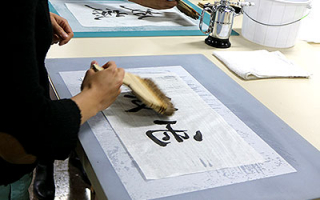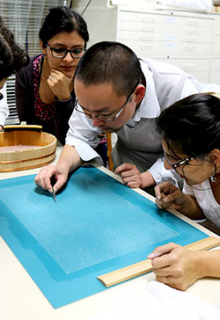Organizers
- Coordinación Nacional de Conservación del Patrimonio Cultural, Instituto Nacional de Antropología e Historia (CNCPC-INAH), Mexico City, Mexico
- National Research Institute for Cultural Properties, Tokyo, Japan
- ICCROM
Background
Over the past 25 years, interest for Japanese paper conservation tradition has been growing within the Latin America paper conservation community, as well as Portugal and Spain. The main effort was focused on understanding Japanese techniques, materials and tools. This knowledge was mostly acquired by conservation professionals who attended the Japanese Paper Conservation Course in Japan, jointly organized by the National Research Institute for Cultural Properties and ICCROM, or by receiving training in small workshops taught by colleagues who have had the opportunity to study abroad and had been in contact with Japanese professionals.
Experience has shown the importance of understanding materials and tools more deeply, as well as the correct application of Japanese paper conservation techniques, before attempting to incorporate them into Latin America paper-based collections or adapting them to the Latin American context.
This is why the CNCPC-INAH, the National Research Institute for Cultural Properties in Japan and ICCROM have offered for five consecutive years the “International Course on Paper Conservation in Latin America: Meeting East."
Considering the number of applications and the great interest shown by the participants in the preceding years, combined with the need to expand and consolidate knowledge in this field, the course will be offered again for the sixth year, with the generous contribution of INAH and the Japanese National Research Institute for Cultural Properties, Tokyo, Japan.
The course
The purpose of this course is to provide basic concepts of Japanese materials and techniques for paper conservation, and improve participant understanding of the basic characteristics of the Japanese paper tradition.
The course also aims to build bridges between Japanese and Western paper conservation traditions, and to assess the applicability of the Japanese approach, materials and techniques to non-Japanese cultural heritage, with particular reference to Latin American paper-based cultural heritage.
Finally, the course promotes the exchange of experiences and information on paper conservation in Latin America and the Caribbean.
Methodology
The course is an intensive two and a half week programme that combines theory and practice, through lectures and practical work. High-level interaction is encouraged in the course, with participants playing an important part.
Participants
The international course is open to a maximum of nine (9) participants working in Latin America and the Caribbean. Consideration will also be given to candidates working in Spain and Portugal. At least five years of working experience in paper conservation is required. Preference will be given to candidates who are working in an institution, who are involved in training activities, or who lead conservation teams.
Teaching team
The teaching team will include Japanese and Latin America instructors from leading institutions.
Scholarships
The selected participants will receive a scholarship covering accommodation. Candidates are encouraged to seek financial support from all possible sources, such as governmental institutions, employers, and other funding agencies to cover their travel expenses as well as per diems for their daily expenses.


